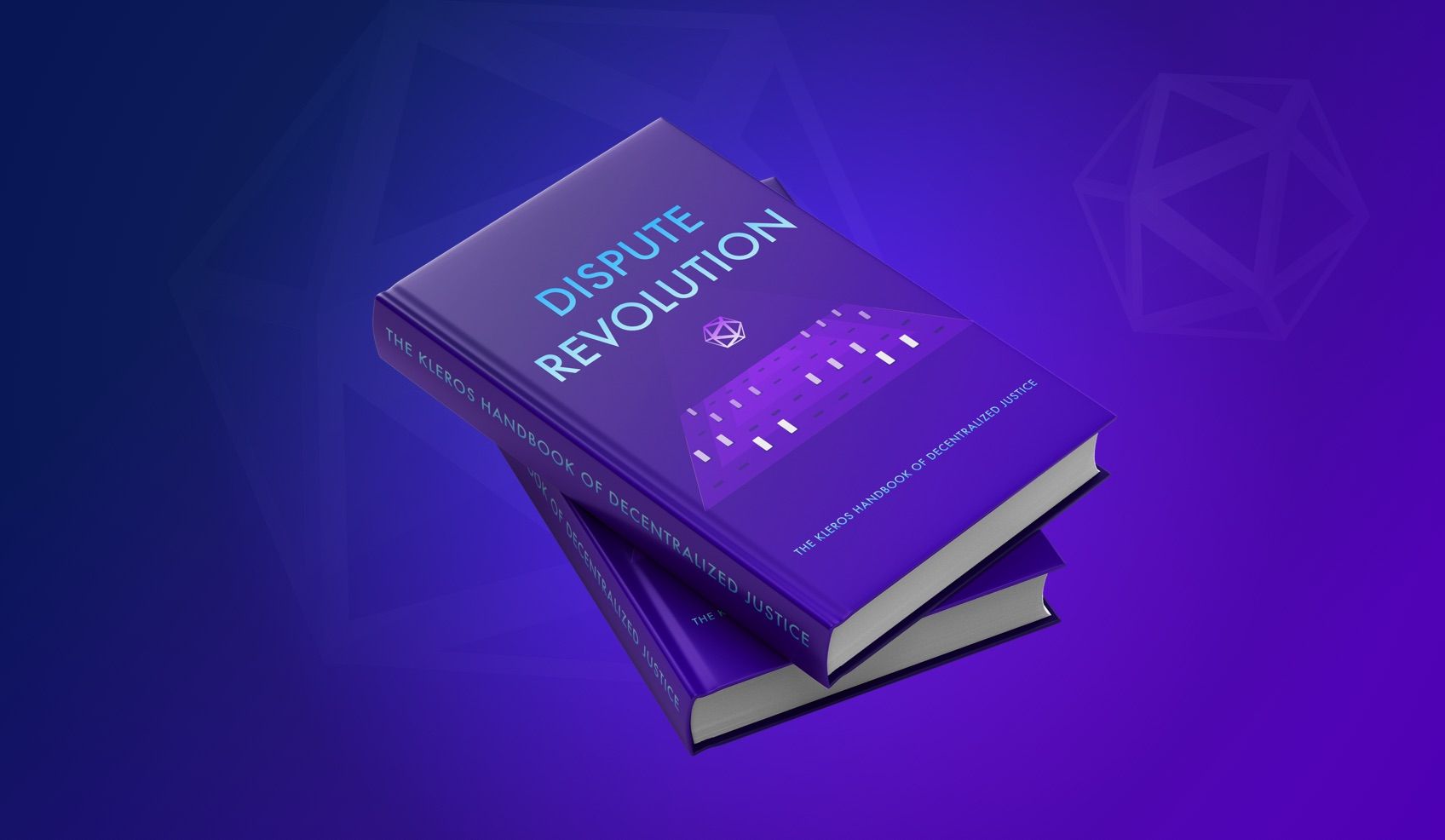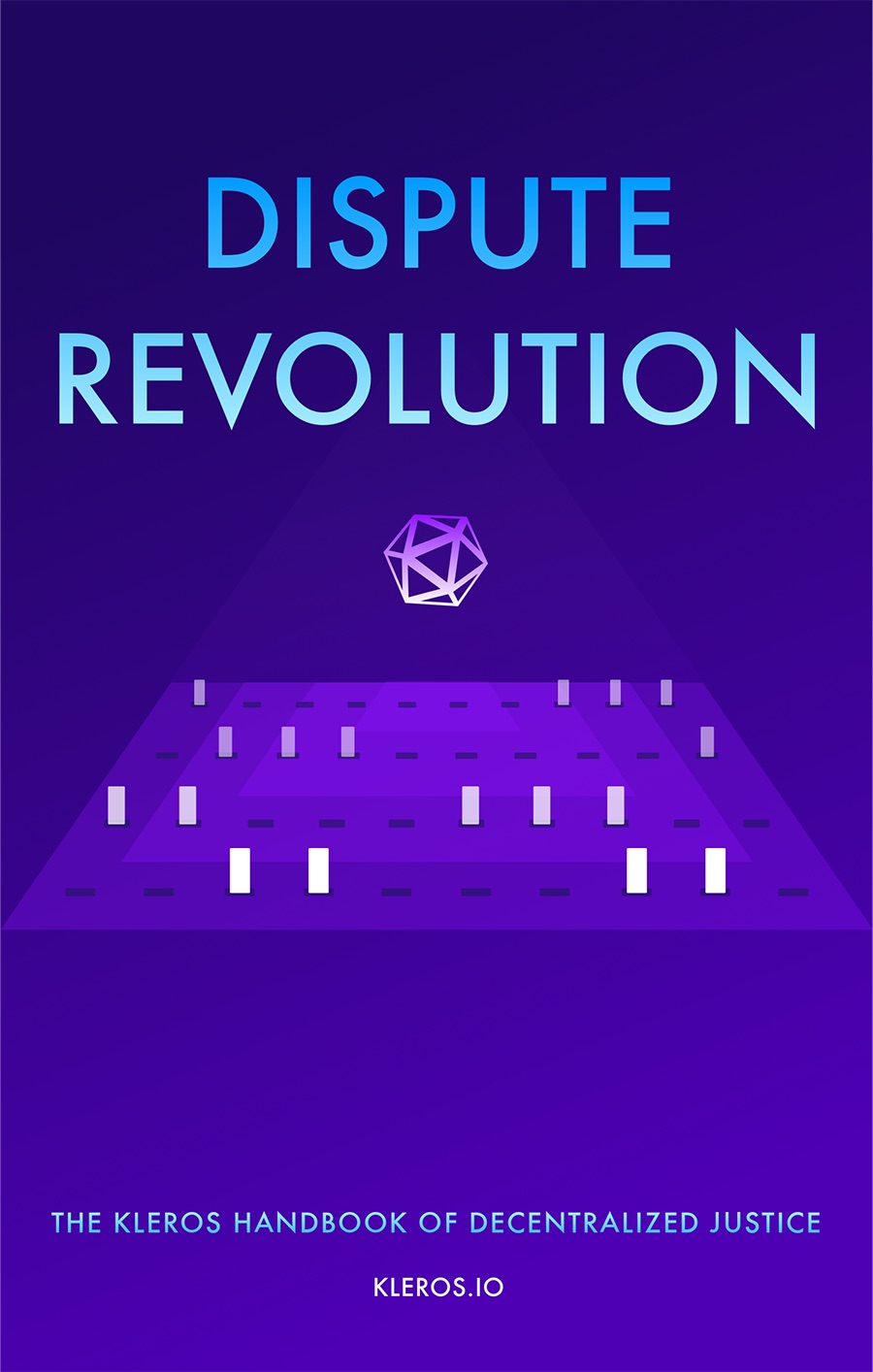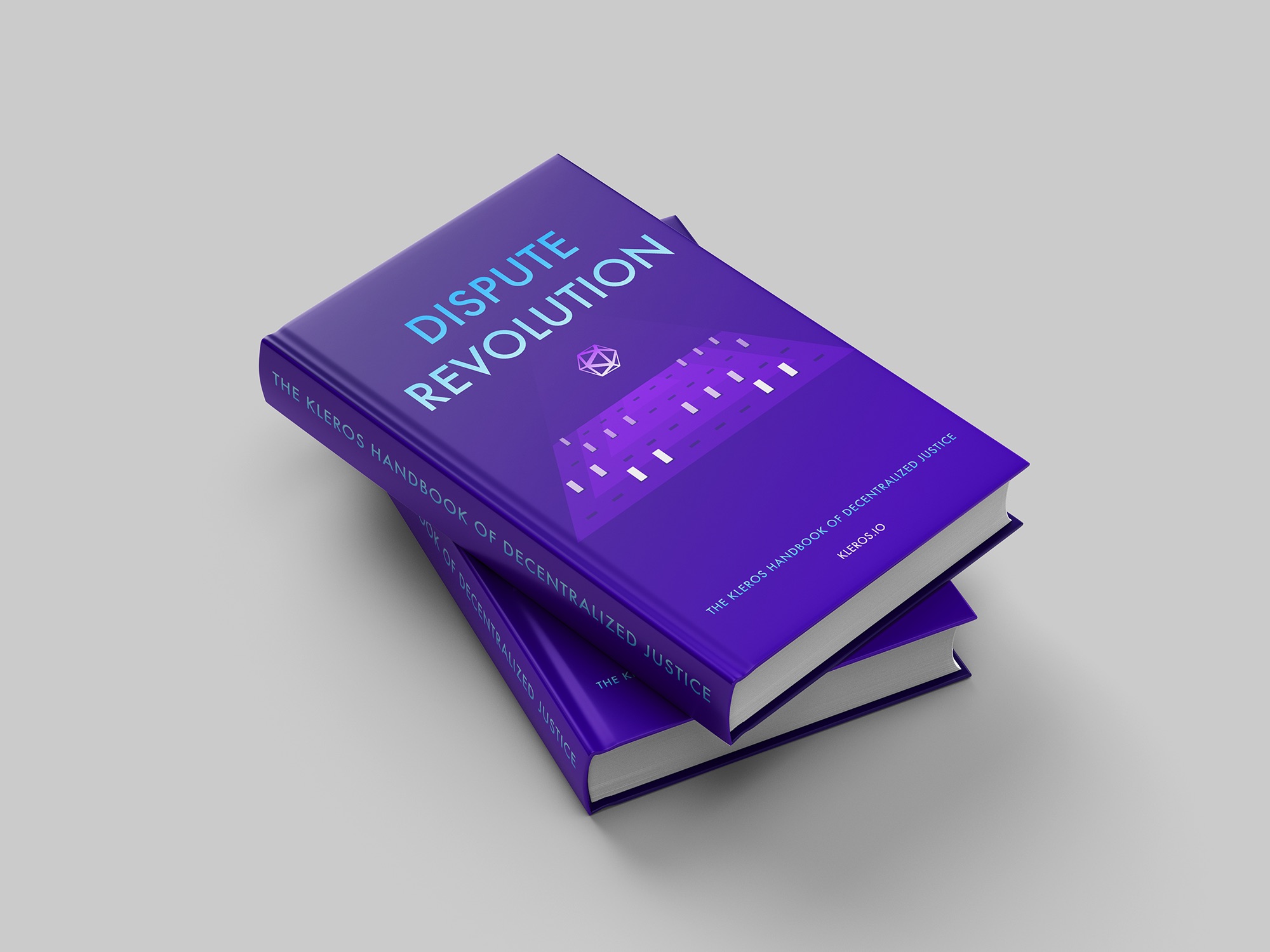Dispute Revolution: The Kleros Handbook of Decentralized Justice
Working in the blockchain ecosystem is a mixture of producing secure, viable and efficient protocols whilst experimenting with cutting edge technology.

"If I have seen further it is by standing on the shoulders of Giants"
-Isaac Newton.
Download Dispute Revolution in your preferred format!
EPUB
MOBI
Working in the blockchain ecosystem is a mixture of producing secure, viable and efficient protocols whilst experimenting with cutting edge technology.
These new social technologies are updating some of humanity’s core institutions such as finance, law and government, enabling communities to respond to the new challenges of the Internet Age.
In the past two years, at Kleros we have focused on one specific aspect of this new governance paradigm: dispute resolution.
In order to make our research more accessible and to kickstart a discussion about the potential implications of this emerging technology, we decided to compile this seminal book: Dispute Revolution. The Kleros Handbook of Decentralized Justice.

The book focuses on a number of key pillars we deem important to understanding the main tenets of Kleros and also broader questions about the nascent industry and academic field of decentralized justice.
Does decentralized justice solve a real problem? Is the solution economically viable? Can the right incentives be created for users to be honest? Is this new resolution method fair? Can it be adopted at large scale by societies?
Contributors include Kleros team members as well as academic experts and industry leaders in law, economics, moral philosophy, computer science, political theory and online dispute resolution.
We are addressing institutions that effectively have not changed for two centuries. In an ever accelerating world, foresight for the future of law needs to come from a humanistic, cross-discipline perspective.
Dispute Revolution does not contain any definitive answers. On the contrary, it tries to pose key questions to be answered.
We would be happy if this book could strike up discussion and became the beginning of a research and development roadmap for this emerging field. We would be even happier if this book could kickstart a community of entrepreneurs and activists willing to push the ideals of decentralized justice.
The book will be available in electronic format on March 4th.
Fill in your data in here to receive a download link as soon as the book is published.

"We are at the dawn of a new era. The innovations we craft and hone today may shape the lives of generations to come. We have a lot of work to do, but I believe this book is an important contribution to the effort." -
-Colin Rule, Vice President for Online Dispute Resolution at Tyler Technologies. Ex Director of Online Dispute Resolution for eBay and PayPal.
“The very origins of the idea of democracy are now being reborn with the rise of decentralized networks and the need for having fair and efficient governance mechanisms. I’m very hopeful to see the work of Kleros grow and have a profound impact, as it’s able to interact with the many different contexts where technology like this becomes relevant."
-Santiago Siri, President at Democracy Earth Foundation.
"What I find the most fascinating about Kleros is the idea that you are going to leverage blockchain as a space in the ether that allows people to file a complaint using a system based on blockchain, and wisdom of the crowds. This can greatly enable efficiency and reduce costs in a large number of dispute resolution processes."
-Joseph Raczynski, Legal Futurist at Thomson Reuters Legal.
Summary
Chapter 1: Genesis: When Greek Lotteries Meet Medieval Private Law
This chapter addresses the two historical tenets on which Kleros’ technology is envisaged. Through in-depth interviews with three political scientists, Josiah Ober, Peter Stone and Barry Weingast, we explore the roots of decentralized justice in Athens, lex mercatoria in medieval Europe and how sortition fits into the tradition of Western political thought.
Chapter 2: Technology: Cryptoeconomics Unlock the Future of Justice
This chapter covers the technologies involved in decentralized justice. Experts on game theory, such as Hebrew University professor Eyal Winter and our cryptoeconomic researcher William George try to bring these concepts closer to the layman reader. The chapter also helps expand the knowledge base of our expert audience by sharing our learning with smart contracts, building user experience in legal tech applications, as well as presenting proposals for Ethereum standards (or ERCs). Included in this chapter also is an in-depth analysis of Kleros' Doges on Trial pilot, the first experiment in decentralized justice.
Chapter 3: Dispute Revolution. A New Justice Paradigm in an Old World
This chapter deals with the implications this technology might have for law and the broader society. By sharing their experiences in online dispute resolution and research on blockchain and industry, thought leaders such as Gillian Hadfield and Primavera de Filippi explain how decentralized justice might affect the future of law. In this chapter, particular care is taken to analyze the most critical points of any arbitration system - fairness and whether the system complies with existing rules of arbitration.
Chapter 4: The Business of Decentralized Justice
This chapter tries to paint an image of how the legal industry might evolve in the coming years. By bringing in decades of experience in future-centered thinking through conversations with Professor Orna Rabinovich-Einy, Joe Raczynski, Thomson Reuters resident legal futurist, Colin Rule, the creator of eBay and PayPal’s dispute resolution systems, Peter Hunn from Accord Project and legal design expert José Torres, we discuss the opportunities and hurdles in building new legal systems for the 21st Century.
Chapter 5: Scaling Up: the Applications of Decentralized Justice
The final chapter of the book focuses on the use cases of Kleros, where we combine the vision and practice to define the key ingredients which will make Kleros the dispute resolution system of the future. Experts from JP Morgan and Stanford, among others present their research into Kleros as a solution for a plethora of use cases, ranging from decentralized freelancing, decentralized marketplaces, trading in derivatives to fake news, social media, online gaming and AI.
Contributors
- Federico Ast, CEO, Kleros
- Luis Bergolla, Doctoral Law Student, Stanford
- Plinio Braga, Design Lead, Kleros
- Nicolas D’Agnillo, Financial Analyst, JP Morgan
- Rossana Deplano, Lecturer in Law, Leicester University
- Daniel Dimov, Dimov Internet Law Consulting
- Primavera de Filippi, Researcher, CNRS, Harvard Law School
- William George, Research Lead Kleros
- Gillian Hadfield, Lecturer, University of Toronto
- Peter Hunn, Founder, Clause.io, Accord Project
- Stuart James, Communications Lead, Kleros
- Clément Lesaege, CTO, Kleros
- Damjan Malbašić, Writer, Kleros
- Marco Mauer, Legal Engineer
- Joel Monegro, Partner, PlaceholderVC
- Alice Namuli Blazevic, Lawyer
- Dmitry Narozhny, Civil Law Attorney
- Josiah Ober, Professor of Political Science and Classics, Stanford University
- Enrique Piqueras, Dev Lead, Kleros
- Orna Rabinovich-Einy, Professor, University of Haifa
- Joseph Raczynski, Technologist and Futurist, Thomson Reuters Legal
- Colin Rule, Vice President of Online Dispute Resolution, Tyler Technologies
- Amy Schmitz, Professor of Law, University of Missouri
- Abeer Sharma, International Arbitration Lawyer
- Kate Sills, Community Lead, Agoric
- Santiago Siri, President, Democracy Earth Foundation
- Peter Stone, Associate Professor, Trinity College, Dublin
- José Torres, Member, Board of Directors, LEGIS
- Sam Vitello, Developer, Kleros
- Barry Weingast, Professor of Political Science, Stanford University
- Eyal Winter, Professor, Hebrew University, Jerusalem
Download Dispute Revolution in your preferred format!
EPUB
MOBI
Before you go... interested in becoming a Kleros Juror?
You can always sign up to become a juror adding your email to a mailing list. Use of our juror platform is fully decentralized of course but this lets us get in touch to notify of any pilots or real Dapp's ready for you to arbitrate on.

Join Kleros!
Join the community chat on Telegram.
Visit our website.
Follow us on Twitter.
Join our Slack for developer conversations.
Contribute on Github.


